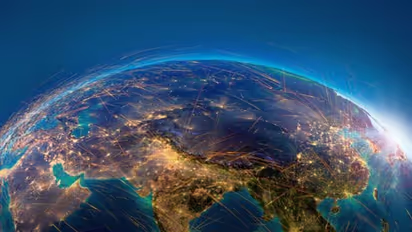Demystifying the Global South and the power it wields

Synopsis
The Global South, with its substantial population and increasing economic power, possesses the potential to challenge the prevailing Western-led global order. Defence expert Girish Linganna explores this grouping in detail.
The Global South, with its substantial population and increasing economic power, possesses the potential to challenge the prevailing Western-led global order, as explained in discussions about the nations comprising this group. The dissolution of the Soviet-led bloc in 1991 and the emergence of BRICS nations (Brazil, Russia, India, China, and South Africa) in the late 2000s have ignited discussions regarding the significance of the Global South in today's global landscape.
Nonetheless, recent developments, such as the Ukraine conflict, have underscored the importance of the Global South. These countries have demonstrated a reluctance to cut off their economic ties with Russia or impose sanctions on Moscow, indicating their autonomous position in global affairs.
Understanding the Global South
The term 'Global South' came into use during the Cold War, emphasizing the economic inequalities between industrialized nations in the northern hemisphere and the developing nations located in the southern hemisphere.
In 1969, Carl Oglesby coined the term 'Global South' to describe the Vietnam War and the global social structure influenced by centuries of exploitation by the countries in the Global North.
Belonging to a Global South nation entails various consequences:
Some of the implications include:
1. Elevated infant mortality rates.
2. Reduced life expectancy.
3. Restricted access to quality education.
Poverty remains an enduring obstacle, resulting in heightened migration in pursuit of improved prospects. Further, Global South nations disproportionately face environmental problems like waste and pollution, often caused by wealthier nations.
Mapping the Global South
The Global South encompasses an extensive geographic region, spanning Mexico, the Caribbean, South America, Africa, the Middle East, and portions of Asia.
Although it accounts for more than 85 per cent of the world's population, its contribution to global GDP is approximately 40 per cent.
Countries like China and Turkey, even though they have become economically strong, consider themselves part of the Global South. They do this to distance themselves from Western colonial history and build new relationships in politics and economics based on working together.
The Voice of the Global South Summit
In January 2023, India organized the first-ever Voice of the Global South Summit, offering a platform for developing nations to discuss their common issues and priorities. With the involvement of delegates from 125 countries, this online gathering became the largest digital conference of leaders and ministers from the developing world.
The Voice of the Global South Summit wants to bring together countries from the Global South, like the Non-Aligned Movement did in 1961. This effort aims to unite the Global South and promote a world where power is shared among many nations.
The Future of Global South
The emergence of the BRICS group, comprising four Global South nations (Brazil, China, India, and South Africa) alongside Russia, provides optimism for tackling socio-economic inequalities between the Global North and the Global South. These countries are exploring options outside of Western-dominated organizations and alliances, which could lead to greater development and autonomy in the southern regions.
Nonetheless, Western nations might not be willing to give up their former colonies easily. As alternative sources of power become more important in the developing world, Western countries may use various methods to hold onto their influence.
Climate change presents a major problem for the Global South. These countries frequently face the harshest consequences of extreme weather, higher sea levels, and disruptions to farming. These effects worsen the existing social and economic gaps and jeopardize the development advances achieved by Global South nations.
To tackle this problem, the Global South must work together and push for climate fairness. By calling for just and equal solutions, these countries can secure a sustainable future for both themselves and the planet.
Russia's Role in the Global South
Russia has been actively cooperating with developing nations, forming partnerships and economic connections that support the progress and stability of these countries. Russia's engagement with the Global South, especially through efforts like BRICS, shows its dedication to promoting a world order where power and influence are distributed among several significant players, rather than being dominated by the West.
Check the Breaking News Today and Latest News from across India and around the world. Stay updated with the latest World News and global developments from politics to economy and current affairs. Get in-depth coverage of China News, Europe News, Pakistan News, and South Asia News, along with top headlines from the UK and US. Follow expert analysis, international trends, and breaking updates from around the globe. Download the Asianet News Official App from the Android Play Store and iPhone App Store for accurate and timely news updates anytime, anywhere.